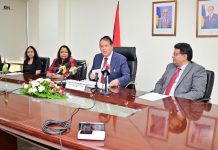Africa-Press – Mauritius. In the workup to the general election in May 2010, under the title ‘The Great Responsibility of Political Leaders’ an article in this paper had drawn attention to the dangers that verbal violence during the campaign posed and the consequences on partisans of the contending parties.
An extract from that article highlights this problem: ‘Listening to them criticizing each other, the people might well conclude that the political leaders are sworn enemies and that, if ever the occasion arose, they would not hesitate to kill the opponent who is targeted as being a mortal enemy!
“Nothing could be further from the truth, which is the exact opposite of popular perception.
Unfortunately, it is this erroneous perception that influences the behavior of political supporters who themselves have a real enmity to the point, as we have seen many times, of physically fighting and even killing each other.
‘Was it only to remind potential hotheads of the futility of their intestinal quarrels, given the resulting suffering for loved ones, and especially that, the elections over, between the candidates who had vowed a certain aversion and had led their principals in this logic, everything is back to normal as far as their personal relationships are concerned.
They only kill each other politically – their followers, alas, manage to do it by attacking each other, physically, in the flesh. ‘The political leaders whose messages, even indirectly, lead to these killings are still on the run – and they continue to use the provocative language that risks triggering the same kind of slippage…Hence the importance of this reminder of the great responsibility to political leaders.
‘Let them deeply gauge the tenor of the words that will escape from their mouths, because they can have a disproportionate range.
Everyone knows that to regain their credibility, they often dedicate themselves to communal clientelism and in the midst of the ‘nou bannes’, they urge the latter to perceive themselves as permanent victims of the other – whose identity is implicit. in their words.
‘In this period of an already overheated atmosphere, they dare to play on the keyboard of differences and the ‘majority-minority’ refrain in these nocturnal occult circles, while claiming to be the unique vectors of national unity when they face the public gallery.
Let voters be on their guard against these hypocrites! ‘All chiefs should send a strong signal: they will not tolerate comments that risk stirring up communal hatred and sectarian references that have no place in modern Mauritius.
It seems, however, that some politicians are bent on making verbal threats even after the elections are over, and there is no Mauritian of whatever community who has not been shaken by the words of DPM Soodhun vis-à-vis the Leader of Opposition, Xavier Duval, which rose to a threat to eliminate the latter.
However much Mr Soodhun may claim that he did not mean what he said and that Duval over-reacted, the fact is that harm has been done. And the delay in the police’s response has further aggravated the situation.
On numerous occasions, we have pointed out the importance for people in leadership positions to carefully weigh their words whenever they address an audience, especially if that audience is made up of ‘nou bannes’ who are credulous enough to take as gospel truth whatever they hear , and are prepared to act on it.
Even if they had no reason to do so, violent words may incite them to find a pretext and go on a rampage, and in the process as we have seen all over the world, both the perpetrators and their target victims end up suffering damage or loss.
While this is bad enough during times of war or of political tension at election time, it is tragic to say the least when no such situation exists and people expect to be going about their daily routine in a peaceful atmosphere.
Such kinds of verbal violence coming from the mouth pits of those who are supposed to speak honorably have ripple effects at all levels of society, and nowadays social media helps to accelerate the spread to the most vulnerable minds, those of the young people who are the major users of social media in all settings, from school to the world of work.
And imagine the impact on those who are not employed and are looking for some excitement to fill their idle time. We must salute those who have reacted against such slippages, and let this be an eye-opener to all those who think that at this stage of our development anything and everything will be tolerated!
For More News And Analysis About Mauritius Follow Africa-Press







